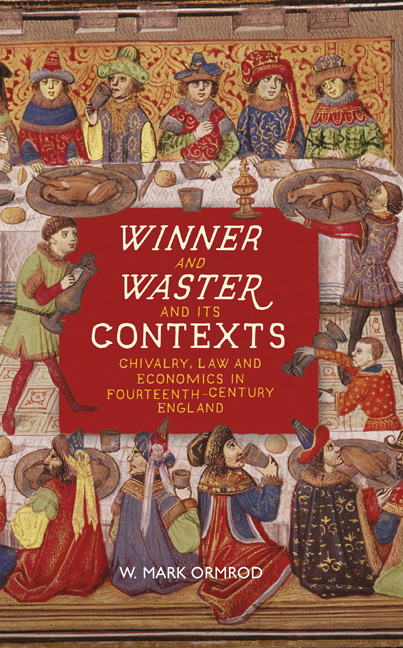Book contents
- Frontmatter
- Contents
- Acknowledgements
- Note on Editions
- List of Abbreviations
- Introduction: Winner and Waster: A Poem on the Times
- 1 Chivalry and Internationalism: The Garter Feast of 1358 and English Diplomacy during the 1350s and 1360s
- 2 Treason, Public Order and Dispute Settlement: The Statute of Treasons of 1352 and Royal Arbitration
- 3 Landed Society, Conspicuous Consumption and the Political Economy: The Sumptuary Laws of 1363
- 4 The Private and the Public Spheres: The Royal Household and State Finance under Edward III
- 5 Satire, Complaint and Authorship: Winner and Waster and the Alliterative Revival of the Fourteenth Century
- 6 Winner and Waster: Timeliness and Timelessness
- Appendix 1 Timeline, 1337–70
- Appendix 2 A Modern English Version of Winner and Waster
- Bibliography
- Index
- Publisher̕s Note
Introduction: Winner and Waster: A Poem on the Times
Published online by Cambridge University Press: 09 April 2021
- Frontmatter
- Contents
- Acknowledgements
- Note on Editions
- List of Abbreviations
- Introduction: Winner and Waster: A Poem on the Times
- 1 Chivalry and Internationalism: The Garter Feast of 1358 and English Diplomacy during the 1350s and 1360s
- 2 Treason, Public Order and Dispute Settlement: The Statute of Treasons of 1352 and Royal Arbitration
- 3 Landed Society, Conspicuous Consumption and the Political Economy: The Sumptuary Laws of 1363
- 4 The Private and the Public Spheres: The Royal Household and State Finance under Edward III
- 5 Satire, Complaint and Authorship: Winner and Waster and the Alliterative Revival of the Fourteenth Century
- 6 Winner and Waster: Timeliness and Timelessness
- Appendix 1 Timeline, 1337–70
- Appendix 2 A Modern English Version of Winner and Waster
- Bibliography
- Index
- Publisher̕s Note
Summary
Winner and Waster (W&W) is a Middle English poem written, most likely, during the third quarter of the fourteenth century. It survives in a single manuscript, London, British Library Additional MS 31042, one of the two miscellanies of texts made in the mid-fifteenth century by Robert Thornton, a gentleman of East Newton in the North Riding of Yorkshire. The extant text is divided into a prologue and three ‘fitts’, or sections, divided at suitable points where the performer (assuming it to be a social reading) might refill his wine-cup (lines 216–17, 366–7). Thornton's text of W&W is, however, incomplete. The poem breaks off after 503 lines at a hiatus in the manuscript; supposing that the original was longer (and it remains possible that Thornton was also working with an incomplete version), it is unclear what proportion is now lost. The text is also corrupt in places, and the final extant folio is badly damaged; the level of intervention in modern editions has varied greatly and the precise meaning of some passages remains uncertain.
The prologue to the poem represents a general complaint upon the unsettled times, in which the services of artful poets are no longer recog-nised as they once had been. In the first fitt, the narrator then tells of his journey into ‘the West’ where, in a delightful woodland setting, he fell asleep and dreamed the dream that follows. The scene is an opening within the woods, surrounded by earthworks. Armed men and others are gath¬ered in the groves to either side, and at the crest of the earthworks sits a pavilion adorned with the imagery of the Order of the Garter. A wild man (sometimes referred to as the first knight) stands nearby, bedecked in the heraldry of King Edward III. The king himself is revealed, seated in state within the pavilion and clothed in fantastic robes which themselves also bear the emblem of the garter. The king calls forth the finest knight (some¬ times referred to as the second knight, or herald) in his own entourage and instructs him to go amongst the assembled forces to find out the nature of the quarrel reported there, so that it can be brought to peaceful resolution.
Information
- Type
- Chapter
- Information
- Winner and Waster and its ContextsChivalry, Law and Economics in Fourteenth-Century England, pp. 1 - 14Publisher: Boydell & BrewerPrint publication year: 2021
